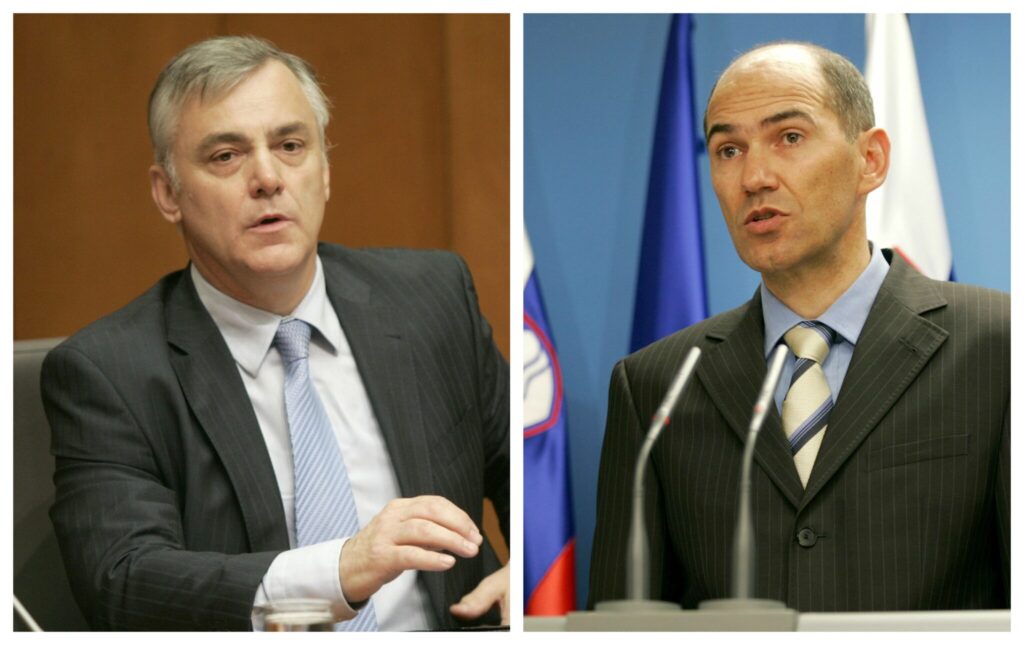The answer to the question of how the former Prime Minister Janez Drnovšek, who was also the former president of the LDS party, tried to protect his then-Minister of the Interior, Mirko Bandelj, by coming to an agreement with the editor of Slovenske novice, Marjan Bauer, is no longer confidential. Namely, the director of the Criminal Police Directorate, Aleksander Jevšek, is the person who removed the label of strict confidentiality off of the report on abuses of power in the Vič Holmec affair – which is still not obtainable – in 2007.
Editor-in-Chief Peter Jančič figured this out after trying to obtain the so-called Gričar report from the police in recent months. At first, the police did not find it, but then they announced that they could not show Jančič the report, because of protection of privacy. However, as they did not invoke confidentiality when refusing access, Jančič asked if they might have removed the label of strict confidentiality. The police confirmed that the labels had been removed. However, a dispute with the Information Commissioner is currently ongoing, as to whether the content of the report can be disclosed to the public.
After a conversation between Drnovšek and Baur, the Government Communication Office, which was led by Marta Kos at the time, tried to shift the blame for spreading false information about the alleged killings in the independence war to the Serbian intelligence, Siol reported, adding that the manipulations about whose fault it was, were poorly written by foreign informants. However, the boss of the Slovene Intelligence and Security Agency (SOVA), Drago Ferš, did not agree with it, and Bauer did not publish it. In order to protect himself, he reportedly hid a floppy disc, which indicates that Janez Drnovšek was actually well informed about the background of the affair. It is interesting, however, that Ferš, who did not agree with the launch of untrue information in order to divert attention, soon found himself retiring, due to his “resistance”.
“Another interesting part of the report, which we are still not allowed to see, for the sake of protecting the privacy of those involved, is the description of how the then-Minister of the Interior, Mirko Bandelj, who was eventually dismissed by the National Assembly due to this affair, influenced the reporting of Slovenske Novice and tried to get them to defame the then-leader of the opposition, Janez Janša.” The editor Bauer and the then-journalist Bojan Budja refused to write lies, in connection with the defaming of Janša.
As is clear from the part of the report that the police are not ready to show to the public yet, these are descriptions of privacy, which is of an official nature. In August, the former Minister Bandelj, who is also a well-known lawyer, responded to Siol’s claims on covering up the interesting report on the spread of lies about the alleged crimes, committed by the Slovenian soldiers and police at the time of the war for independence, during the fight for Vič and Holmec border crossings, which also shows how the politics used the intelligence services and negotiated for the defence of its ministers, during the time of the LDS government: “With the so-called Gričar’s report, you are obviously trying to substantiate the legality of Hojs‘s actions. In doing so, however, you should also take it into account, that this fantasy writing is mostly fictional, and it was even created illegally. The court has also ruled on this several times. It also (at least in part) banned the distribution of the report. I am enclosing two (quickly accessible, as I find it pointless to deal with the case from twenty years ago) court decisions,” Bandelj wrote, attaching the court decision in the matter of Žarko Bogunović‘s complaints that the investigators illegally obtained extracts from his telephone contacts and that Gričar’s report violated his rights.
The rights of individuals, even journalists, were violated
“Under the leadership of Bandelj, systematic violations of the rights of individuals and even journalists happened at the Ministry of the Interior,” Jančič points out, adding that this is mainly known because the brother of the then-head of the Government Communication Office, Drago Kos, a detective, allowed the RTV Slovenia journalist Tomaž Ranc to take a look at the list of the people that he spoke to over the phone, while he was questioning him about his reporting on the Vič Holmec affair. Ranc caused problems at the top of the ministry with his reporting on the events, and during their conversation, he asked Kos if he had obtained permission from the court to obtain the Telekom data on his telephone conversations.
“This resulted in a long dispute and Ranc eventually managed to win the lawsuit against the state in the Supreme Court, for illegally monitoring a journalist. Even if the judge allowed the data about who the journalist spoke to, to be obtained, it would still be illegal,” is what was written about Kos’s list of data on Ranc’s telephone conversations in the ruling, signed by the Supreme Judge Anton Gašper Frantar.
When the police announced that Gričar’s report was no longer labelled as strictly confidential, they informed Jančič of the official decision. The part of the report presented by Jančič after the removal of the label strictly confidential cannot be obtained, as the police refer to the protection of privacy. In their rejection, they also referred to the judgment of the Supreme Court of the Republic of Slovenia that “criminal proceedings are no longer subject to the right of access to public information, with which the Supreme Court restricted public access to information on the work of prosecutor’s offices and courts.” Despite everything, Bandelj had to leave his post in the end, when he was interpellated. In contrast, the infamous Kos, husband of the POP TV editor Tjaša Slokar Kos, even climbed to the top of the predecessor of today’s Commission for the Prevention of Corruption, with the help of the left-wing parties.
Sara Kovač


